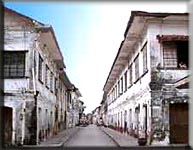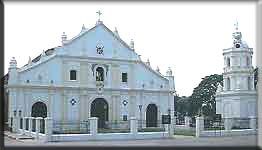|
 The
Vigan Houses The
Vigan Houses
The Vigan ancestral houses were built by Chinese taipans who made
fortunes out of indigo dye, abel fabrics, gold, tobacco and other
export items. The massive brick and plaster houses with red tiled
roofs and imposing doorways, grand staircases, broad narra floorboards
and piedra china, sliding capiz windows and ventanillas and cool
azotea reflect the artistic and technological craftsmanship of the
18th and 19th century native artisans who developed an architectural
style adapted to the earthquake-prone tropics.
 Calle
Crisologo Calle
Crisologo
Further south of the Cathedral, one finds the stretch of Calle Mena
Crisologo lined with ancestral. These houses, built by the Biguenos
of Chinese ancestry engaged in trade, barter and manufacture o findigo
dye, abel (woven) fabric, gold, tobacco and other goods. Being the
only surviving colonial city in the country, Vigan has more than
180 ancestral houses and historical landmarks tightly strung along
the narrow streets of the old Mestizo District, popularly known
then as Kasanglayan (Chinese quarters).
St. Paul Metropolitan Cathedral
The cathedral was build by the Augustinians 1790-1800 in distinctive
"Earthquake Baroque" architecture. It has three naives
, twelve altars and a choir loft. Chinese influence is evident in
its baptistry altar, China-forged brass communion handrails, a pair
of Fu Dogs and moldings on the facade. Most of the original church
interior features and artifacts are still in place. The octagonal
church belfry is located 15 meters south of the cathedral.

Just recently, its museum Museo San Pablo was opened
to public which showcases ecclesiastical artifacts and other religious
crafts of the past.
Other Tourist Attractions and Destinations..
page 2 - page
3.
|
|